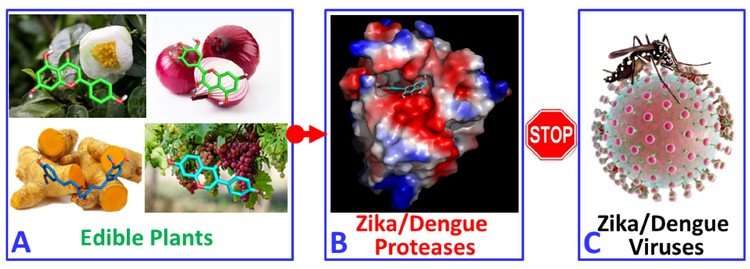Natural compounds fight against Zika and Dengue viruses

NUS biologists have discovered that many edible plants contain natural compounds that can protect us from Zika and Dengue viruses.
Zika and Dengue viruses are two prevalent mosquito-borne viral diseases which have adverse and serious outcomes. Both these viruses belong to the same category, known as flavivirus. Despite its adverse impact on human health, there is no vaccine or medication available yet to effectively treat Zika or Dengue infections.
A team led by Prof SONG Jianxing from the Department of Biological Sciences, NUS discovered that a number of fruits and vegetables contain natural compounds that can disrupt the replication machinery of the Zika and Dengue viruses in the human body. These compounds are able to attach themselves to the enzyme responsible for the virus replication process and stop it. They are present in many commonly available foods such as tea, red onions, yellow ginger and grapes. The researchers found that these compounds belong to two groups: (i) natural phenols and (ii) flavonoids.
Natural phenols are compounds which can be found extensively in plants such as tea and yellow ginger, and have been demonstrated to have significant antioxidant effects. Flavonoids are the most important plant pigments for flower colouration, producing yellow or red pigmentation in petals to attract pollinator animals. The team also obtained a greater understanding of the relationship between the structure of these compounds and its associated biological activity. This knowledge can help in the design and development of drugs against the Zika and Dengue viruses.
Prof Song said, "Our studies on the molecular mechanisms of the replication machinery of the Zika and Dengue viruses suggest that this machinery is susceptible to changes at a site other than the enzyme's active site. This offers new drug design strategies to fight against these viruses."
In the future, the research team plans to develop ways of enhancing these natural compounds to make them more effective against the Zika and Dengue viruses.
More information: Amrita Roy et al. Solution conformations of Zika NS2B-NS3pro and its inhibition by natural products from edible plants, PLOS ONE (2017). DOI: 10.1371/journal.pone.0180632



















